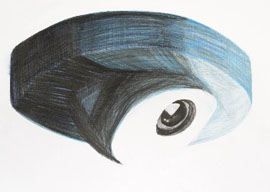
October 20, 2010

While it is hardly surprising that intelligence agencies would want to gather intelligence, a conscientious citizen can only be as comfortable with corporate surveillance and government’s growing powers as his or her good faith will allow. Not that anyone is asking permission.
The Google “WiSpy” scandal that came to light last May hardly inspires confidence. Apparently, their Street View vehicles gathered more than uninvited photographs as they patrolled the Western world’s every inch. Since 2007, they’ve been scooping up “payload data,” including web-surfing activity and private emails, from open Wi-Fi networks. When the German government pressed them for an explanation, Google claimed it was all a big “mistake” and insisted they will delete the data”unlike their Gmail account holders” detailed profiles.
When Eric “Don’t Be Evil” Schmidt says, “We know where you are. We know where you’ve been. We can more or less know what you’re thinking about,” you can be sure that he means it. Given the ambiguous (at best) motives of history’s most powerful individuals, I find these developments quite chilling.
Add to this surveillance cameras” proliferation in public areas”tens of thousands in New York City, half a million in London’s “ring of steel,” cameras on traffic lights nationwide, in shopping malls, in nightclubs, in schools, in nurseries”and you get the funny feeling that you’re being watched.
Of course, it is practically impossible for all of these cameras to be monitored effectively. Unless you could somehow entice private citizens to assist in the process…
On October 4, Internet Eyes went live in the UK. The program’s participants”13,000 so far”are given access to CCTV feeds of retail outlets nationwide. Their mission is to spot shoplifters and antisocial behavior. A £1,000 prize is offered for the snoop with the most busts. If the program is successful, perhaps average citizens could be enlisted for other mass-surveillance projects. Of course, high-tech surveillance equipment has been marketed to the general public for years. Aside from office security cameras, popular Internet monitoring software”with clever names such as SpyAgent, SpecterPro, and IamBigBrother”enables any corporate manager to sift through his employees’ emails and Web searches.
For the average Joe, companies such as BrickHouse Security offer a wide range of equipment for DIY spook operations. Anyone can order high-resolution cameras disguised as common electrical outlets, air filters, smoke detectors, or sunglasses”all for $200. You can watch your kids, your spouse, or the guy next door. Every week a new perv gets caught installing recording devices in a women’s bathroom. So what are the chances that some weirdo has filmed your bodily functions in action”picking your nose, having sex, or vigorously masturbating in a hotel room? Think of it this way: How many people have a burning curiosity and 200 bucks to blow?
Even if you don’t mind Big Brother watching you, the swarms of Little Brothers in His shadow ought to ring your alarm bells. Or maybe you don’t care. Maybe you’ve been told to smile for the camera since you were knee-high to a tripod. Group photos mean friendship, and sex tapes make you famous. Just as the religious man learns to accept the fact that God watches his every move, so may the child of technocracy consider the Electric Eye to be a normal aspect of modern life.
I would never be so paranoid as to insist that every watcher behind the camera is purely evil. To the extent that technology is neutral, a surveillance state’s rise is only as insidious as the uses to which it is put. After all, who would argue against identifying criminals, improving products, or securing personal property?
And yet, as I contemplate undesirable citizens” fate during the 20th century’s herd-culling upheavals”Hitler’s Germany, Stalin’s Russia, Mao’s China, or Pol Pot’s Cambodia”the unprecedented ability to cultivate public opinion in real time, while tracking otherwise anonymous individuals, lifts my neck hairs. Big Brother is a silent observer in an era of tolerance and open discourse. But if the national mood is consumed by distrust and volatility, the All-Seeing Eye may burn right through you.